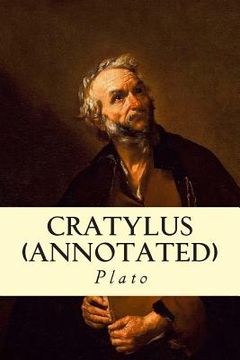Reseña del libro "Cratylus (Annotated) (en Inglés)"
The Cratylus has always been a source of perplexity to the student of Plato. While in fancy and humour, and perfection of style and metaphysical originality, this dialogue may be ranked with the best of the Platonic writings, there has been an uncertainty about the motive of the piece, which interpreters have hitherto not succeeded in dispelling. We need not suppose that Plato used words in order to conceal his thoughts, or that he would have been unintelligible to an educated contemporary. The subject of Cratylus is the correctness of names in other words, it is a critique on the subject of naming (Baxter). When discussing an onoma and how it would relate to its subject, Socrates compares the original creation of a word to the work of an artist.[11] An artist uses color to express the essence of his subject in a painting. In much the same way, the creator of words uses letters containing certain sounds to express the essence of a word's subject. There is a letter that is best for soft things, one for liquid things, and so on.[12] He comments;The best possible way to speak consists in using names all (or most) of which are like the things they name (that is, are appropriate to them), while the worst is to use the opposite kind of names. One countering position, held by Hermogenes, is that names have come about due to custom and convention. They do not express the essence of their subject, so they can be swapped with something unrelated by the individuals or communities who use them. The line between the two perspectives is often blurred.[clarification needed] During more than half of the dialogue, Socrates makes guesses at Hermogenes' request as to where names and words have come from. These include the names of the Olympian gods, personified deities, and many words that describe abstract concepts. He examines whether, for example, giving names of "streams" to Cronus and Rhea - flow or space) are purely accidental. Don't you think he who gave to the ancestors of the other gods the names "Rhea" and "Cronus" had the same thought as Heracleitus? Do you think he gave both of them the names of streams merely by chance? The Greek term may refer to the flow of any medium and is not restricted to the flow of water or liquids.[16] Many of the words which Socrates uses as examples may have come from an idea originally linked to the name, but have changed over time. Those of which he cannot find a link, he often assumes have come from foreign origins or have changed so much as to lose all resemblance to the original word. He states, "names have been so twisted in all manner of ways, that I should not be surprised if the old language when compared with that now in use would appear to us to be a barbarous tongue." The final theory of relations between name and object named is posited by Cratylus, a disciple of Heraclitus, who believes that names arrive from divine origins, making them necessarily correct. Socrates rebukes this theory by reminding Cratylus of the imperfection of certain names in capturing the objects they seek to signify. From this point, Socrates ultimately rejects the study of language, believing it to be philosophically inferior to a study of things themselves.

